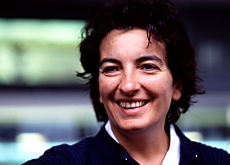
Making a better world through trade

Fired from her post as head of the Max Havelaar fair-trade foundation, Paola Ghillani tells swissinfo about her new corporate ethics venture.
Ghillani’s philosophy is that economic activity should not be an end in itself, but an instrument to make the world a better place.
swissinfo: Six months ago your role as head of Max Havelaar ended abruptly. Looking back, how do you view the events that led to your dismissal?
Paola Ghillani: I had six fantastic years there. With my team, we succeeded in increasing turnover fivefold, increased our market share in bananas by 50 per cent, and by 30 per cent in flowers. We also raised brand recognition from 40 to 80 per cent.
Of course, I left the company suddenly and against my will. But overall I only hold on to the positive.
swissinfo: Do you have regrets, or projects that you didn’t manage to carry out?
P.G.: My biggest regret is not being able to finish my work. What I miss most is the precious and very direct contact with the small producers and workers in developing countries.
swissinfo: Is that what gave you the desire to launch your own company, Paola Ghillani & Friends?
P.G.: Yes, I felt like holding onto the most positive aspects of my experience at Max Havelaar, to use them for the benefit of my new company.
The aim of this venture is to inspire and help firms to integrate aspects of economic, social and environmental responsibility [into their operations].
swissinfo: There are many groups already active in this sector. Is there really a place for you and what will your focus be?
P.G.: It’s true that sustainability and social responsibility are widely spoken about now. But this mostly relates to steps companies can take parallel to their daily economic activity. What my company offers is ways to help managers to better integrate these ideas into the core strategy of the company.
In the Enron and Parmalat scandals, the economic responsibility of the company was not respected. The businesses were not managed with sufficient transparency. Their attitude ultimately led to bankruptcy, leaving thousands of people jobless.
While certain companies perhaps have the feeling they are socially aware, often they don’t even know where their primary materials come from or what the working conditions are of the people who produce them.
My idea is that companies should put sustainability and social responsibility at the centre of what they do.
swissinfo: Who are the “Friends” of Paulo Ghillani?
P.G.: The friends are all those people who believe we can improve the world through economic activity. That goes from the consumer to the producer, and includes the media.
The Friends can also be competitor companies and even enemies… as long as they share the same vision as us.
swissinfo: Have you already launched some projects?
P.G.: Yes, a few. But it’s too early to talk about them in a concrete way. They are still at the strategic phase. What I can say is that I sense a great enthusiasm.
Companies want to get involved. Of course they are a little apprehensive, because they always have a lot of pressure in relation to their quarterly results – especially those that are quoted on the stock exchange. But there is a real will to integrate these notions of responsibility as a key factor of their success.
swissinfo: Are companies aware that this approach can work in their favour?
P.G.: Absolutely. This engagement will improve their image – and they know it – but also their results, because consumers are more and more demanding with regard to environmental and social responsibility.
swissinfo: How do you explain this awakened consumer conscience?
P.G.: In my opinion, it stems from financial scandals. Chief executives who earn millions and then let thousands of employees go just after announcing their results – it’s a bitter pill to swallow.
Humanitarian disasters also arouse very strong reactions. I’m thinking of New Orleans. Today these victims must be disgusted and saying to themselves – ‘they left us practically to starve because we did not have enough economic value.’
What happened [after the hurricane] will definitely change things, especially in the United States.
swissinfo: What work is your company doing at the moment? Have you hired any staff?
P.G.: For the moment, I am alone… But my aim is to take on staff, because I think the duty of all businesses is to create employment.
That’s my philosophy. That economic activity should not be an end in itself. It’s an instrument to make the world a better place. And, one day, I would like to be able to introduce those fine theories into my own company.
swissinfo-interview: Alexandra Richard
A pharmacist by profession, Paola Ghillani began her career at Ciba/Novartis.
In 1999, she became the director of Max Havelaar, a fair-trade organisation.
In six years, she increased turnover fivefold from SFr42 million to SFr 210 million.
In March 2005, Paola Ghillani was dismissed for undisclosed reasons.
Six months later, she has launched her own company, Paola Ghillani & Friends.
Ghillani is also a member of the board of the International Committee of the Red Cross.

In compliance with the JTI standards
More: SWI swissinfo.ch certified by the Journalism Trust Initiative

























You can find an overview of ongoing debates with our journalists here . Please join us!
If you want to start a conversation about a topic raised in this article or want to report factual errors, email us at english@swissinfo.ch.